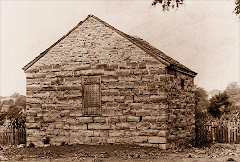
Rod Miller's novel, The Assassination of Governor Boggs is a creative attempt to answer the mystery of who shot former Missouri Governor, Lilburn Boggs.
After leaving office as Governor of Missouri, Lilburn Boggs maintained a residence in Independence Missouri, the location of the original violence and atrocities perpetrated against the Mormon Saints. On a stormy night, an assassin took his best shot, trying to rid the world of Governor Boggs and his nefarious activities. Many supposed, including the Boggs family, that the Mormons were behind the assassination attempt, and specifically that Porter Rockwell shot Lilburn Boggs under orders of Joseph Smith. To the surprise of the doctors, the newspapers and his family, Lilburn Boggs, the Governor who issued the infamous Extermination Order of Missouri Mormons survived the attempt on his life and lived for another 17 years.
Despite having many political and business enemies Lilburn Boggs believed the Mormons were behind his attempted assasination. He lived in fear the remainder of his days, expecting the Mormons to come and finish the job. Because of this fear, at least in part, Boggs moved to California where he became a man of substantial influence. This historical novel begins after Bogg's death when his son William engages the services of the Pinkerton Detective Agency to solve the crime that occurred 25 years earlier. Calvin Pogue is the detective assigned to the case.
The Pinkerton Man's investigation leads him to California, Nauvoo, Independence and Salt Lake City as he attempts to piece together the motive, facts and evidence of the 25 year old crime. Pogue is an honest seeker of truth and is determined to follow the evidence whereever it leads. He is a likeable and determined character.
Rod Miller uses this account of a fictional investigation to add context to the Missouri Persecutions of the 1830's. Through Pogue's dispassionate interviews with lawmen, LDS apostates, LDS leaders such as Brigham Young, Emma Smith, sympathizers like Alexander Doniphan and even Porter Rockwell himself, he explores both sides of the conflict that presumably led to the assassination attempt. Each character speaks with a unique voice consistent with the era and Miller does a nice job salting the story with authentic details of frontier life in the 1860's.
As church members we usually only read and hear apologetic accounts that hold out all Missourian's as mobbers and evil-doers, while all Mormons were pure, faithful and innocent victims of a wicked government led by Lilburn Boggs. Miller regales us however with accounts of Mormon enforcers called Danite "night riders" and we quickly see that both sides possessed the power to behave badly. As is generally the case, there is rarely pure evil and pure righteousness personified in fallible human beings. Every person, whether it's Lilburn Boggs or Porter Rockwell share a split personality of good and evil. Some traits are nobel and strong and worthy of emulation, while others serve as examples of what not to do.
I enjoyed this story a great deal. Rod Miller is a unique storyteller. It took me a couple of chapters to appreciate how he juxtaposed early interviews in the investigation with pieces of his final interview with Porter Rockwell. Because the interviews didn't always follow a linear time line, we sometimes heard repeated accounts by secondary sources to the investigation. While these redundancies sometimes slowed the pace of the story, they also served to reinforce the truthfulness or inconsistencies of the different interview subjects. When we read a secondary account of the same events, as the reader we draw our own conclusions about the trustworthiness of the account, just as Detective Pogue did.
I enjoyed learning more about Porter Rockewell and Lilburn Boggs and I always appreciate an engaging church history story.
On a personal note, I served my mission in Independence Missouri. Following my mission and schooling I moved to a small town in Caldwell County Missouri near Far West where I still live and currently serve as the Bishop of the Far West Ward for the Church of Jesus Christ of Latter-day Saints. I have a deep love for this area and the rich LDS history and I believe there is much we can learn from both the successes and failures of the early saints.
Understanding the weaknesses and mistakes of the early saints can be educational if we recognize the saints for who they were; imperfect people who lived during a dangerous and challenging time that in many ways is impossible for us to fully appreciate. Sometimes we base our faith on the actions and behaviors of people we look up to and when we find that a person isn't as perfect as we once thought, we become disillusioned. This can be one of the risks in studying church history and I hope readers will remember this and not make the foolish mistake of judging the gospel doctrine and worthiness of the church based on the imperfections of individuals.
This book asks many direct questions and leads the reader to ask many more of his own. While I may not agree with all the conclusions of Pogue's investigation I certainly enjoyed the ride and the creative way in which the history and the associated questions were presented. My one major criticism of this work concerns the final chapter. I won't describe the issue because it could be a spoiler for the reader, but I found the final scene, which I believe is purely fictional with no basis in fact, to leave the reader with an unfortunate bias which could influence their conclusions.
So did Porter Rockwell attempt to assassinate Lilburn Boggs? And if so, did he do it under order of Joseph Smith? You'll have to read the book and make your own decision.
I recommend this book to anyone who is interested in tasting the flavor of the Missouri period of the church. It is an enjoyable read during which you have the opportunity to learn.

























No comments:
Post a Comment